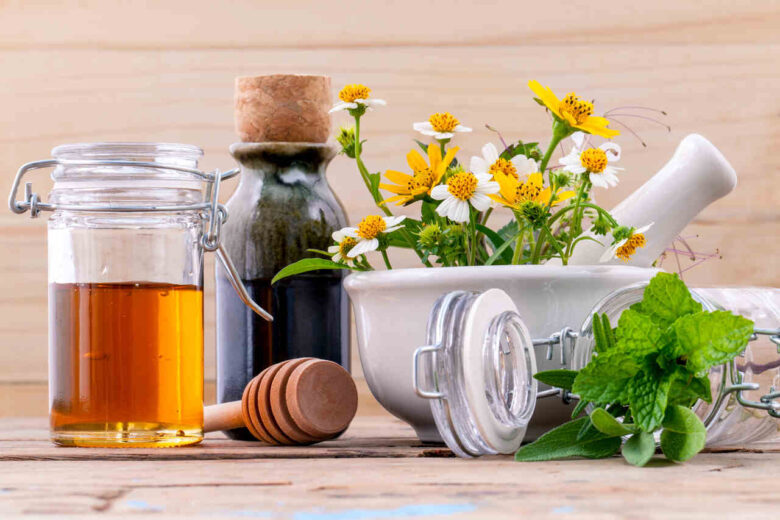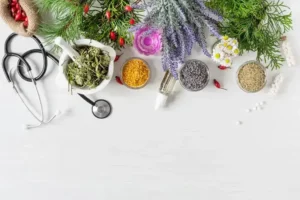Nowadays, people deal with stress all the time because of how fast-paced life is. From stress at work to problems in your personal life, the steady demands can often feel too much. Mindfulness, meditation, and exercise are all well-known ways to deal with stress. However, nature also has many plant treatments that can be very effective at helping people rest and feel less stressed. People from many countries have used these natural remedies for hundreds of years to help them relax and heal.
This piece will talk about some of the most well-known herbal ways to relieve stress and how they can help your mind and body get back in balance.
1. Why Use Herbal Treatments for Stress?
When it comes to treating stress, herbal treatments are often better than drugs because they have fewer side effects. While prescription drugs can make you sleepy or dependent on them, many herbs have mild, long-lasting benefits that help the body’s natural ability to calm down and deal with stress. Herbal medicines are also easy to use every day because they come in drinks, pills, potions, and skin uses.
There are many ways that herbs can help relieve stress. They can calm the nervous system, keep the mood stable, and support the health of the adrenal glands. Let’s look more closely at some of the most common herbs that are used to treat stress.
2. Ashwagandha also known as Withania somnifera
The herb ashwagandha has been used in Ayurvedic medicine for thousands of years. It helps the body adapt to stress. Adaptogens help the body deal with stress and get back to a state of balance by controlling hormone levels, especially cortisol, which is known as the stress hormone. Over time, having high amounts of cortisol can cause worry, nervousness, and even trouble sleeping.
Aswagandha has been shown in studies to lower cortisol levels and make the body better able to deal with stress. Regular use of ashwagandha may help you sleep better, give you more energy, and improve your mood in general.
In different forms, such as pills, tablets, and liquids, ashwagandha can be used. As a vitamin, people often take 300 to 600 mg per day, based on their needs, to help them deal with stress.
2. Lavender (Salvia officinalis)
Many people know that lavender can help calm and soothe them. Over the past few hundred years, it has been used to help sleeplessness, stress, and worry. Just the smell of lavender has been shown to make people feel less anxious and more relaxed.
There are chemicals in lavender, such as linalool and linalyl acetate, that calm the nervous system. The use of lavender oil in massage or breathing it in has been shown to greatly lower anxiousness and promote a calm, happy state of mind.
The plant’s essential oils can be used in massage, it can be made into tea, or it can even be mixed with bath salts for a relaxing soak. At night, putting a few drops of lavender essential oil on a fan or pillow can help you sleep better and feel less stressed.
3. Chamomile
One of the most common herbs used to calm down is chamomile. It helps calm the mind and body by making you feel a little sleepy. Some chemicals in chamomile help your body make more serotonin and melatonin. These chemicals are very important for controlling your mood and sleep.
Chamomile is often drunk as a tea, and its calming properties make it a great choice for lowering stress and promoting sound sleep. After a long day, a lot of people find that having chamomile tea before bed helps them calm down.
How to Use: This plant is most often used to make tea. Put one to two teaspoons of dried chamomile flowers in hot water and let them steep for five to ten minutes. Then, drink the tea to help you relax and sleep better.
4. Valeriana officinalis, or Valerian Root
Valerian root has been used for a long time to treat nervousness and sleeplessness naturally. This plant is known to help people relax, which makes it a great choice for people who have trouble sleeping because of stress. Valerian root works by raising the brain’s GABA levels. GABA is a chemical that helps calm the nervous system and make you feel relaxed.
Valerian root has been shown in studies to help people sleep better and fall asleep faster. People who feel nervous or anxious at night will benefit the most from it.
How to Use: Valerian root can be bought in pill, extract, or tea form. The usual amount to take is between 400 mg and 900 mg, 30 minutes before going to bed.
5. Melissa officinalis, or lemon balm
Lemon balm is a type of mint that is known to help calm people down and improve their happiness. It has been shown to lower anxious symptoms and improve brain function. This makes it especially helpful for people who have stress-related brain fog or trouble focusing.
When mixed with other herbs like valerian root or chamomile, lemon balm’s calming benefits can help you relax and feel less stressed. Lemon balm is another great herb for getting a better night’s sleep without making you sleepy the next day.
How to Use: You can drink lemon balm tea or take it as a supplement. A teaspoon or two of dried lemon balm leaves should be steeped in hot water for five to ten minutes to make lemon balm tea.
6. Rhodiola (Rhodiola rosea)
Another plant that helps the body deal with stress is rhodiola. It has been shown to give people more energy, make them less tired, and improve their happiness in general. Rhodiola works by restoring balance to the body’s stress response system and making it stronger against physical and mental stress.
It is especially helpful for people who are constantly stressed, burned out, or tired because it makes their mental and physical performance better. Rhodiola can help you think more clearly and concentrate while also easing the physical effects of worry.
Rhodiola is usually taken as a vitamin in amounts between 200 mg and 600 mg per day. To avoid waking up, it’s best to take it in the morning.
7. Passion flower, or Passiflora incarnata
Passionflower is a natural medicine that has been used to help people with stress, sleeplessness, and restless nerves. Just like valerian root, it works by raising GABA levels in the brain, which helps to calm the nervous system and make you feel more relaxed. For people who have worry or stress that keeps them from sleeping, passionflower works especially well.
Passionflower has been shown in studies to help people with generalized anxiety disorder (GAD) feel calmer and less anxious.
How to Use: You can get passionflower in pills, extracts, and teas. A lot of people drink it as tea, made by letting one to two teaspoons of dried passionflower flowers soak in hot water.
In conclusion
Herbal treatments have been used for hundreds of years to help people relax and deal with stress. Nature has many things that can help you feel better emotionally and less anxious, such as peaceful drinks and fragrant oils. If you use these herbs every day, they can help you deal with stress in a natural, non-invasive way, instead of just taking drugs.
But keep in mind that herbs can help relieve stress, but they shouldn’t be used instead of medical care. To make sure that these herbs are safe for you, you should always talk to a doctor or nurse, especially if you are pregnant, nursing, or taking medicine.
You can better deal with stress and live a more balanced, peaceful life if you pick the right plant treatments and combine them with healthy habits like exercise, good diet, and awareness.




